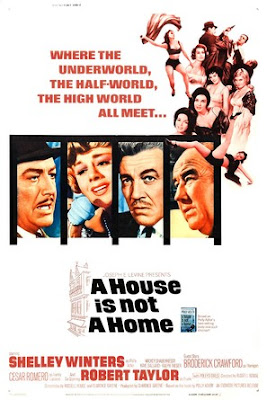A House is Not a Home was a 1964 drama that brought in lousy reviews and mediocre box-office, despite the Oscar-nominated costumes of Edith Head as well as a theme song by Burt Bacharach and Hal David that has become a standard. This loose dramatization of Polly Adler’s storied life as the madam of a New York bordello starred Shelley Winters. Such Hollywood favorites as Robert Taylor, Cesar Romeo (as gangster Lucky Luciano), Broderick Crawford, and Jesse White all had featured roles. In the early Sixties, with the old Production Code heading for its final fadeout, Hollywood was starting to explore the implications of sexuality, and the role played by sex in the power-struggles of the era. But artistic timidity was still the rule, and the film focused much of its attention on Polly’s own love life. It was, clearly, a far cry from Adler’s own memoir of the same name, a frank look back at how a very young Jewish immigrant from a Russian shtetl—forced to make her way in NYC—discovered that by running a classy brothel catering to mobsters and politicians she could carve her own rich slice of the American pie.
I bring all this up because my colleague, Debby Applegate, has recently published Madam: The Biography of Polly Adler, Icon of the Jazz Age. Applegate, who won the Pulitzer Prize for her biography of the Reverend Henry Ward Beecher, enjoys writing about subjects whose sexual escapades are outside the pale. She depicts Polly Adler as moving quickly from girlish innocence to a matter-of-fact acceptance of mankind’s sexual proclivities. And she focuses on Adler’s contributions to an age when mobsters and politicians (including the on-the-rise FDR) would meet and mingle at a swanky brothel, along with such members of the press as Robert Benchley and Walter Winchell. It makes for fascinating reading.
Some of Polly’s “girls” (like the perennial sarong-clad Dorothy Lamour) went on to legitimate showbiz careers. Which led me to think about the ways in which the two professions overlap. No, this isn’t a critique of the moral lapses of actresses, although historically women who made their livings on the stage were widely assumed to be morally compromised. But prostitution, after all, is a career that requires acting skills. Jane Fonda makes this point during her performance as a call-girl in 1971’s Klute: “For an hour I’m the best actress in the world.”
Fonda won a Best Actress Oscar for this role. The Hollywood Reporter not long ago published a list of all the Hollywood actresses who’ve nabbed Oscar nominations for representing on screen what the magazine calls “The Oldest Profession in Oscar History.” The list contains almost twenty names, and many of them have been winners, everyone from Greta Garbo in 1930’s Anna Christie to Kim Basinger in L.A. Confidential (Best Supporting Actress, 1997) and Charlize Theron in Monster (2003). The roles fall into several categories. There are the exuberant “happy hookers” (see Melina Mercouri in Never on Sunday, Shirley MacLaine in Irma la Douce, and of course Julia Roberts in Pretty Woman, the film that inspired a lot of young girls to think that prostitution was a pretty swell career move). By contrast there are the sufferers, like Shirley Jones who won a Best Supporting Actress Oscar for 1960 for Elmer Gantry, in which she played against type by portraying a fallen woman taking revenge on the man who had despoiled her. Never, though, have I seen on screen a Polly Adler type, someone whose down-to-earth acceptance of carnality makes her a power broker in her own right. One day, perhaps?


Hi Bev, This is Bob. Don’t know how I became “Anonymous” but I’m trying to fix it. Your essay was wonderful, beautifully helping us understand such, at least film wise, a “touchy” (Or maybe NON-touchy) subject. Ms. Applegate’s book also sounds enlightening and solid, I’ll read it. As for the moronic and self defeating Film Code you mentioned, it was like Prohibition (at about the same time). Make alcohol illegal and people will certainly stop drinking. As for The Code, say that sex is wrong or destructive and people will stop having or wanting to have sex.Sure, and maybe they’ll stop eating too. The two “laws” were SO imbecilic, as well as being monumental failures. Did Mae West disappear? Garbo? Ingrid? No (bad pun) F’N way! Peace Bob
ReplyDeleteI do recommend Debby's book, and I completely understand your indignation about both Prohibition (which really helped fuel Polly's rise) and the Production Code. Thanks for writing, Mr. Anonymous!
ReplyDelete